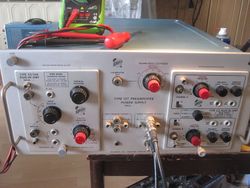127: Difference between revisions
(creation) |
No edit summary |
||
| (26 intermediate revisions by 4 users not shown) | |||
| Line 1: | Line 1: | ||
The Tektronix Type 127 is a power supply and preamplifier for two 1-series or | {{Instrument Sidebar | ||
plug-ins. It is a rack-mount unit with a power supply that resembles the power supply of | |manufacturer=Tektronix | ||
500-series oscilloscope: a 50/ | |model=127 | ||
all output voltages, and 6080 pass tubes for the regulated outputs. | |class=Power supply | ||
|series=500-series scopes | |||
|summary=Preamplifier Power Supply | |||
|image=127_front.JPG | |||
|caption=Tek 127 front view | |||
|introduced=1958 | |||
|discontinued=1972 | |||
|designers= | |||
|manuals= | |||
* [[Media:070-284.pdf|Tektronix 127 Manual]] (PDF) | |||
* [https://w140.com/tek_fcp/tek_type_127_factory_cal_proc.pdf Tektronix 127 Factory Calibration Procedure (PDF)] | |||
* [https://w140.com/tek_127_1968_catalog.pdf Tektronix 127 in 1968 Catalog (PDF)] | |||
}} | |||
The '''Tektronix Type 127''' "Preamplifier Power Supply", [[introduced in 1958]] and made until 1971, is a power supply, calibrator, and unity-gain preamplifier for two [[letter-series and 1-series plug-ins|letter-series or 1-series plug-ins]]. | |||
It is a rack-mount unit with a power supply that resembles the power supply of an early [[500-series scopes|500-series oscilloscope]]: | |||
a 50/60 Hz transformer, [[selenium rectifiers]], a single voltage reference tube controlling all output voltages, and [[6080]] pass tubes for the regulated outputs. | |||
The 127 targets applications where one wants to use Tektronix plug-ins as front-end amplifiers for other instrumentation. | |||
Since [[letter-series and 1-series plug-ins]] have relatively high output impedance, their outputs (i.e., differentially between pins 1 and 3 of the plug-in-to-scope interconnecting plug) are not suitable for directly driving long cables. | |||
The 127 provides 20 MHz unity gain amplifiers that can drive long cables and other low impedance loads. | |||
Each of the two amplifiers in the 127 is fully differential and outputs are on the front and rear panels. | |||
The 127 has unity gain if the output is taken differentially and the load on each output is 170 Ω. | |||
The 127 is a 5U (8.75"/22.2cm) rackmount unit and weighs 37 pounds (16.9kg). Maximum power consumption is 450 W. | |||
<gallery> | |||
127_front.JPG|front view | |||
127_open.JPG|open, selenium rectifier | |||
Tek 127 empty.jpg | |||
Tek 127 rear.jpg | |||
Tek 127 de1.jpg | |||
Tek 127 de2.jpg | |||
Tek 127 de3.jpg | |||
Tek 127 de4.jpg | |||
Tek 127 de5.jpg | |||
Tek 127 de6.jpg | |||
Tek 127 de7.jpg | |||
Tek 127 de8.jpg | |||
Tek 127 de9.jpg | |||
</gallery> | |||
[[Category:Plugin power supplies]] | |||
Latest revision as of 06:23, 18 August 2021
The Tektronix Type 127 "Preamplifier Power Supply", introduced in 1958 and made until 1971, is a power supply, calibrator, and unity-gain preamplifier for two letter-series or 1-series plug-ins.
It is a rack-mount unit with a power supply that resembles the power supply of an early 500-series oscilloscope: a 50/60 Hz transformer, selenium rectifiers, a single voltage reference tube controlling all output voltages, and 6080 pass tubes for the regulated outputs.
The 127 targets applications where one wants to use Tektronix plug-ins as front-end amplifiers for other instrumentation. Since letter-series and 1-series plug-ins have relatively high output impedance, their outputs (i.e., differentially between pins 1 and 3 of the plug-in-to-scope interconnecting plug) are not suitable for directly driving long cables.
The 127 provides 20 MHz unity gain amplifiers that can drive long cables and other low impedance loads. Each of the two amplifiers in the 127 is fully differential and outputs are on the front and rear panels. The 127 has unity gain if the output is taken differentially and the load on each output is 170 Ω.
The 127 is a 5U (8.75"/22.2cm) rackmount unit and weighs 37 pounds (16.9kg). Maximum power consumption is 450 W.
-
front view
-
open, selenium rectifier
-
-
-
-
-
-
-
-
-
-
-













